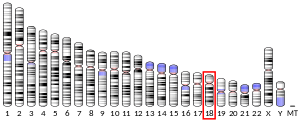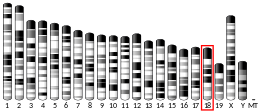ATP8B1
Probable phospholipid-transporting ATPase IC is an enzyme that in humans is encoded by the ATP8B1 gene.[5][6][7] This protein is associated with progressive familial intrahepatic cholestasis type 1 as well as benign recurrent intrahepatic cholestasis.[8]
Function
This gene encodes a member of the P-type cation transport ATPase family and specifically belongs to the subfamily of aminophospholipid-transporting ATPases. This protein is highly expressed in the small intestine, stomach, pancreas, and prostate and is also found in cholangiocytes and the canalicular membranes of hepatocytes in the liver.[9][10] The aminophospholipid translocases transport phosphatidylserine and phosphatidylethanolamine from one side of a bilayer to another. Mutations in this gene may result in progressive familial intrahepatic cholestasis type 1 and in benign recurrent intrahepatic cholestasis.[7] Exactly how mutations result in these diseases is not currently understood.
References
- 1 2 3 GRCh38: Ensembl release 89: ENSG00000081923 - Ensembl, May 2017
- 1 2 3 GRCm38: Ensembl release 89: ENSMUSG00000039529 - Ensembl, May 2017
- ↑ "Human PubMed Reference:".
- ↑ "Mouse PubMed Reference:".
- ↑ Bull LN, van Eijk MJ, Pawlikowska L, DeYoung JA, Juijn JA, Liao M, Klomp LW, Lomri N, Berger R, Scharschmidt BF, Knisely AS, Houwen RH, Freimer NB (Mar 1998). "A gene encoding a P-type ATPase mutated in two forms of hereditary cholestasis". Nat Genet. 18 (3): 219–24. doi:10.1038/ng0398-219. PMID 9500542.
- ↑ Carlton VE, Knisely AS, Freimer NB (Oct 1995). "Mapping of a locus for progressive familial intrahepatic cholestasis (Byler disease) to 18q21-q22, the benign recurrent intrahepatic cholestasis region". Hum Mol Genet. 4 (6): 1049–53. doi:10.1093/hmg/4.6.1049. PMID 7655458.
- 1 2 "Entrez Gene: ATP8B1 ATPase, Class I, type 8B, member 1".
- ↑ Klomp LW, Vargas JC, van Mil SW, et al. (July 2004). "Characterization of mutations in ATP8B1 associated with hereditary cholestasis". Hepatology. 40 (1): 27–38. doi:10.1002/hep.20285. PMID 15239083.
- ↑ Jansen PL, Müller M (July 2000). "The molecular genetics of familial intrahepatic cholestasis". Gut. 47 (1): 1–5. doi:10.1136/gut.47.1.1. PMC 1727973. PMID 10861251.
- ↑ Eppens EF, van Mil SW, de Vree JM, et al. (October 2001). "FIC1, the protein affected in two forms of hereditary cholestasis, is localized in the cholangiocyte and the canalicular membrane of the hepatocyte". J. Hepatol. 35 (4): 436–43. doi:10.1016/S0168-8278(01)00158-1. PMID 11682026.
Further reading
- Knisely AS (2000). "Progressive familial intrahepatic cholestasis: a personal perspective". Pediatr. Dev. Pathol. 3 (2): 113–25. doi:10.1007/s100240050016. PMID 10679031.
- Harris MJ, Le Couteur DG, Arias IM (2006). "Progressive familial intrahepatic cholestasis: genetic disorders of biliary transporters". J. Gastroenterol. Hepatol. 20 (6): 807–17. doi:10.1111/j.1440-1746.2005.03743.x. PMID 15946126.
- Clayton RJ, Iber FL, Ruebner BH, McKusick VA (1969). "Byler disease. Fatal familial intrahepatic cholestasis in an Amish kindred". Am. J. Dis. Child. 117 (1): 112–24. doi:10.1001/archpedi.1969.02100030114014. PMID 5762004.
- Houwen RH, Baharloo S, Blankenship K, et al. (1995). "Genome screening by searching for shared segments: mapping a gene for benign recurrent intrahepatic cholestasis". Nat. Genet. 8 (4): 380–6. doi:10.1038/ng1294-380. PMID 7894490.
- Halleck MS, Pradhan D, Blackman C, et al. (1998). "Multiple members of a third subfamily of P-type ATPases identified by genomic sequences and ESTs". Genome Res. 8 (4): 354–61. doi:10.1101/gr.8.4.354. PMID 9548971.
- Tygstrup N, Steig BA, Juijn JA, et al. (1999). "Recurrent familial intrahepatic cholestasis in the Faeroe Islands. Phenotypic heterogeneity but genetic homogeneity". Hepatology. 29 (2): 506–8. doi:10.1002/hep.510290214. PMID 9918928.
- Halleck MS, Lawler JF JR, Blackshaw S, et al. (2001). "Differential expression of putative transbilayer amphipath transporters" (PDF). Physiol. Genomics. 1 (3): 139–50. PMID 11015572.
- Klomp LW, Bull LN, Knisely AS, et al. (2001). "A missense mutation in FIC1 is associated with greenland familial cholestasis". Hepatology. 32 (6): 1337–41. doi:10.1053/jhep.2000.20520. PMID 11093741.
- Strausberg RL, Feingold EA, Grouse LH, et al. (2003). "Generation and initial analysis of more than 15,000 full-length human and mouse cDNA sequences". Proc. Natl. Acad. Sci. U.S.A. 99 (26): 16899–903. doi:10.1073/pnas.242603899. PMC 139241. PMID 12477932.
- Harris MJ, Arias IM (2003). "FIC1, a P-type ATPase linked to cholestatic liver disease, has homologues (ATP8B2 and ATP8B3) expressed throughout the body". Biochim. Biophys. Acta. 1633 (2): 127–31. doi:10.1016/S1388-1981(03)00107-0. PMID 12880872.
- Chen F, Ananthanarayanan M, Emre S, et al. (2004). "Progressive familial intrahepatic cholestasis, type 1, is associated with decreased farnesoid X receptor activity". Gastroenterology. 126 (3): 756–64. doi:10.1053/j.gastro.2003.12.013. PMID 14988830.
- Gerhard DS, Wagner L, Feingold EA, et al. (2004). "The status, quality, and expansion of the NIH full-length cDNA project: the Mammalian Gene Collection (MGC)". Genome Res. 14 (10B): 2121–7. doi:10.1101/gr.2596504. PMC 528928. PMID 15489334.
- Demeilliers C, Jacquemin E, Barbu V, et al. (2006). "Altered hepatobiliary gene expressions in PFIC1: ATP8B1 gene defect is associated with CFTR downregulation". Hepatology. 43 (5): 1125–34. doi:10.1002/hep.21160. PMID 16628629.
External links
- ATP8B1+protein,+human at the US National Library of Medicine Medical Subject Headings (MeSH)
- Human ATP8B1 genome location and ATP8B1 gene details page in the UCSC Genome Browser.




